In retaliation for recent German bombing of British cities, this week the RAF bombed a number of German cities, including Hamburg. On 15 May in the Western desert British forces launched a surprise attack called “Operation Brevity” against Rommel’s troops at the Halfaya Pass on the Libyan-Egyptian border; but after successful German counter-attacks the operation was called off after just one day. In Iraq British forces began an attack on Iraqi Government forces in Fallujah.
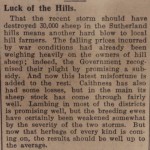 The John O’Groat Journal reported the severe cost of the recent snowstorms to the farmers of the North Highlands, especially in Sutherland. “That the recent storm should have destroyed 30,000 sheep in the Sutherland hills means another hard blow to local hill farmers.” The paper noted that Caithness had not suffered so badly, “but the breeding ewes have certainly been weakened somewhat by the severity of the two storms. But now that herbage of every kind is coming on, the results should be well up to the average.”
The John O’Groat Journal reported the severe cost of the recent snowstorms to the farmers of the North Highlands, especially in Sutherland. “That the recent storm should have destroyed 30,000 sheep in the Sutherland hills means another hard blow to local hill farmers.” The paper noted that Caithness had not suffered so badly, “but the breeding ewes have certainly been weakened somewhat by the severity of the two storms. But now that herbage of every kind is coming on, the results should be well up to the average.”
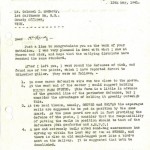 The Wick Home Guard had been inspected by a colonel from Inverness. In a letter dated 15
The Wick Home Guard had been inspected by a colonel from Inverness. In a letter dated 15 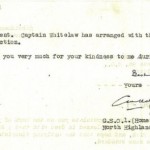 May the colonel wrote to congratulate the battalion. He made a couple of suggestions, such as the importance of defending Milton Farm, but one thing in particular incurred his displeasure: “A new and extremely badly sited sand-bag excrescence has sprung up within the last day or two at 873825, and there is also an old sand-bagged post like a bird’s nest on the railway. It is suggested that both be demolished.”
May the colonel wrote to congratulate the battalion. He made a couple of suggestions, such as the importance of defending Milton Farm, but one thing in particular incurred his displeasure: “A new and extremely badly sited sand-bag excrescence has sprung up within the last day or two at 873825, and there is also an old sand-bagged post like a bird’s nest on the railway. It is suggested that both be demolished.”
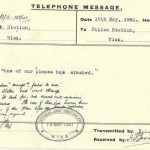 Also on 15 May the police received a terse and dramatic telephone message from RAF Station, Wick, “One of our ’planes has crashed”. A note in the margin reads: “This ’plane, a “Hudson” aircraft, failed to rise from the RAF Station and went through stone walls. It took fire, and several anti-submarine bombs on it exploded. The crew of three had, however, been able to get clear of the ’plane before the bombs exploded, and no person was injured.”
Also on 15 May the police received a terse and dramatic telephone message from RAF Station, Wick, “One of our ’planes has crashed”. A note in the margin reads: “This ’plane, a “Hudson” aircraft, failed to rise from the RAF Station and went through stone walls. It took fire, and several anti-submarine bombs on it exploded. The crew of three had, however, been able to get clear of the ’plane before the bombs exploded, and no person was injured.”
The RAF had established several bombing decoys, or dummy airfields, across the county, in the hopes that the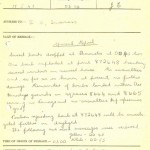 Luftwaffe would bomb the dummies instead of the real airfields. One of these was decoys was at Sarclet, and this may be the reason why Thrumster, which is near to Sarclet, was bombed on 17 May: “Several bombs dropped at Thrumster at 0040 hours. One bomb exploded … breaking several windows in nearest house. No casualties and, so far as is known at present, no further damage. Remainder of bombs landed within Air Ministry grounds … causing no damage and no casualties.”
Luftwaffe would bomb the dummies instead of the real airfields. One of these was decoys was at Sarclet, and this may be the reason why Thrumster, which is near to Sarclet, was bombed on 17 May: “Several bombs dropped at Thrumster at 0040 hours. One bomb exploded … breaking several windows in nearest house. No casualties and, so far as is known at present, no further damage. Remainder of bombs landed within Air Ministry grounds … causing no damage and no casualties.”
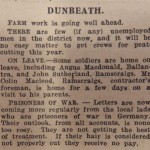 Finally this week the local news from Dunbeath in the John O’Groat Journal reported that farm work was going well, but noted that, because there were so few unemployed men, it would be hard to find crews for peat-cutting. The piece concluded with news of “the local lads who are prisoners of war in Germany. Their outlook, from all accounts, is none too rosy. They are not getting the best of treatment. If their hair is considered not properly cut they receive no pay.”
Finally this week the local news from Dunbeath in the John O’Groat Journal reported that farm work was going well, but noted that, because there were so few unemployed men, it would be hard to find crews for peat-cutting. The piece concluded with news of “the local lads who are prisoners of war in Germany. Their outlook, from all accounts, is none too rosy. They are not getting the best of treatment. If their hair is considered not properly cut they receive no pay.”
